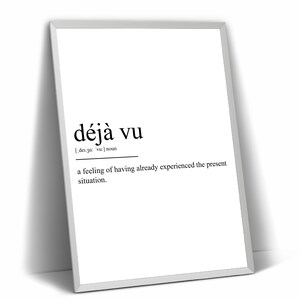


They reflect a degree of subjective awareness of our own memories. Both tip of the tongue and déjà vu are examples of what researchers call “metamemory” phenomena. “That information comes through as the unsettling feeling that we’ve been there before, but we can’t pin down when or why.”Ĭleary has also studied the phenomenon known as “tip of the tongue” – that sensation when a word is just out of reach of recall. “We cannot consciously remember the prior scene, but our brains recognize the similarity,” Cleary said. For example, Cleary and collaborators have shown that déjà vu can be prompted by a scene that is spatially similar to a prior one. It can occur when someone encounters a scenario that’s similar to an actual memory, but they fail to recall the memory. Is it recall of a past life, people have asked? Scientists, though, tend to attack questions through a more logical lens.Ĭleary and others have shown that déjà vu is likely a memory phenomenon. Supernatural reputationĭéjà vu has a supernatural reputation. Brown’s book, The Déjà Vu Experience, she’s been fascinated by the phenomenon and wanted to experimentally unmask why it occurs. But during déjà vu, they felt like they could – which seems to mirror real life.Ĭleary is one of just a handful of déjà vu researchers in the world.

According to their results, participants were no more likely to actually be able to tell the future than if they were blindly guessing. But it sure feels real.Ī professor in CSU’s Department of Psychology, Cleary has a new paper in Psychological Science, co-authored by former graduate student Alexander Claxton, detailing how they recreated déjà vu in human subjects in order to examine the feeling of premonition during the déjà vu state. Say you’re walking up a stairwell for the first time, but it feels familiar, like a dream state – so much so that you think, “At the top of the stairs, there will be a Picasso on the left.”Īnne Cleary, a cognitive psychologist at Colorado State University, has spent the last several years establishing déjà vu as a memory phenomenon – a trick of the brain akin to when a word is on the tip of your tongue, but you just can’t retrieve it.īuilding on previous experiments, Cleary has now shown that the prescient feeling that sometimes accompanies déjà vu is just that – a feeling. Most people can relate to the prickly, unsettling experience of déjà vu: When you’re in a new situation, but you feel like you’ve been there before.įor some, that eerie feeling has an added twist: In that moment, they feel like they know what’s going to happen next.


 0 kommentar(er)
0 kommentar(er)
